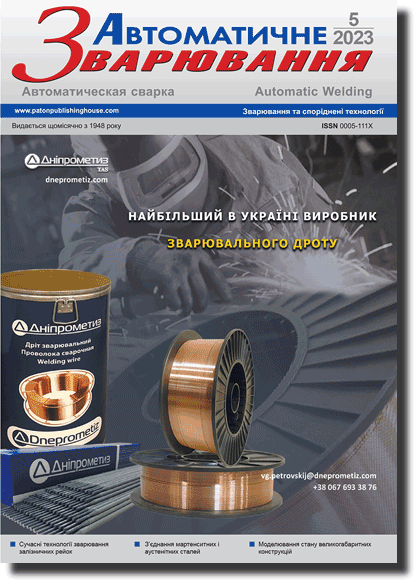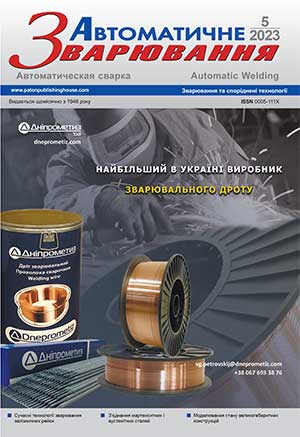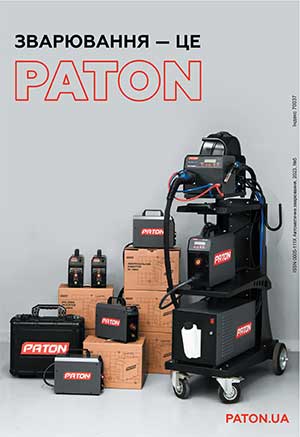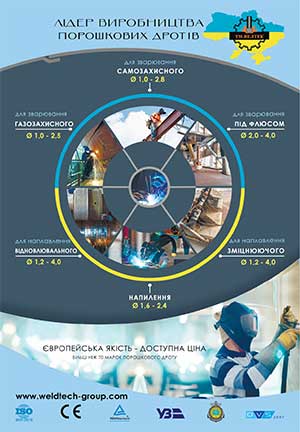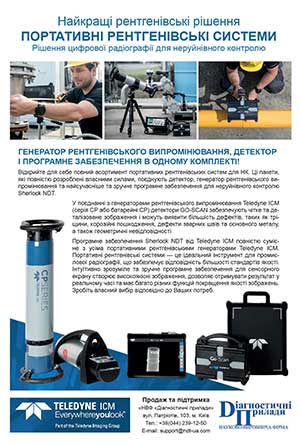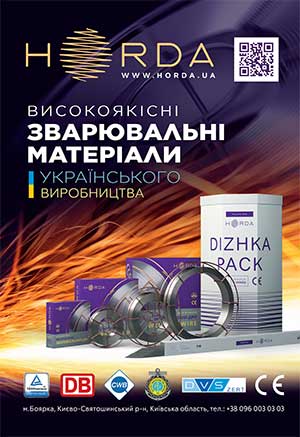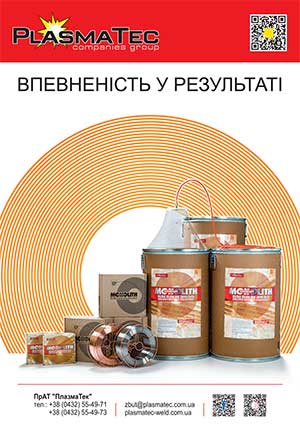| 2023 №05 (07) |
DOI of Article 10.37434/as2023.05.01 |
2023 №05 (02) |
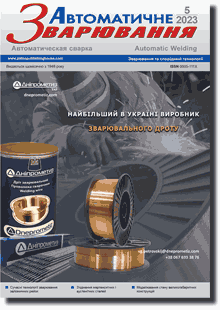
Журнал «Автоматичне зварювання», № 5, 2023, с. 5-17
Сучасні технології зварювання залізничних рейок (Огляд)
І.В. Зяхор1, Є.В. Антіпін1, О.В. Дідковський1, О.В. Кавуніченко1, А.М. Левчук1, Ю.А. Шило1, Yan Truska2
1ІЕЗ ім. Є.О. Патона НАН України. 03150, м. Київ, вул. Казимира Малевича, 11. E-mail: office@paton.kiev.ua2SaZ s.r.o. Company. Koupelní 3908/6, 69501 Hodonín, Czech Republic
Проаналізовано відомі способи зварювання залізничних рейок з точки зору їх ефективності, продуктивності й можливості забезпечення показників якості зварних рейок відповідно до вимог діючих стандартів. При оцінці ефективності різних способів зварювання брались до уваги технологічні особливості формування зварних стиків, показники механічних властивостей, макро- та мікроструктура з’єднань, імовірність утворення дефектів, продуктивність та можливість автоматизації процесу зварювання. Показано, що практичне застосування отримали способи зварювання – термітне, автоматичне електродугове, газопресове, електроконтактне. Різновидами останнього є контактне стикове зварювання (КСЗ) безперервним оплавленням, КСЗ з попереднім підігрівом опором і КСЗ пульсуючим оплавленням. Технологія КСЗ пульсуючим оплавленням дозволяє забезпечити оптимальні термічні цикли при зварюванні сталей з різним хімічним складом і властивостями та забезпечує регламентовану діючими стандартами якість з’єднань. Наукові, технологічні та конструкторські розробки Інституту електрозварювання ім. Є.О. Патона (ІЕЗ) реалізовано в серії стаціонарних і мобільних рейкозварювальних машин, якими комплектуються пересувні рейкозварювальні комплекси, успішно впроваджені у багатьох країнах світу. Бібліогр. 53, табл. 3, рис. 14.
Ключові слова: термітне, електродугове, газопресове, контактне стикове зварювання оплавленням рейок
Надійшла до редакції 10.04.2023
Список літератури
1. Патон Б., Костюк М., Кучук-Яценко С. (2010) Инновационный кластер «Бархатный путь» и научно-технический прорыв Украины на мировой рынок строительства скоростных железных дорог. Наука та інновації, 6(2), 69–86.2. Cantos, P., Pastor, J., Serrano, L. (1999) Productivity, efficiency and technical change in the European railways: A non-parametric approach. Transportation, (26), 337–357. DOI: https://doi.org/10.1023/A:1005127513206
3. Кучук-Яценко С., Яковлєв В., Дідковський О. та ін. (2016) Розвиток технологій та устаткування для зварювання рейок – ключ до розширення мережі суцільнозварних безстикових колій в Україні. Українська залізниця, 1, 56–59.
4. Kuchuk-Yatsenko, S. (2018) Technologies and equipment for flash-butt welding of rails: 60 years of continuous innovations. The Paton Welding J., 11-12, 25–40. DOI: https://doi.org/10.15407/tpwj2018.12.03.
5. Український науково-дослідний інститут металів «УкрНДІМет» (2004) Рейки звичайні для залізниць широкої колії. Загальні технічні вимоги ДСТУ 4344:2004. Київ, Держспоживстандарт України.
6. Railway applications – Track – Rail. Part 1: Vignole railway rails 46 kg/m and above. EN 13674-1:2011+A1:2017. European Committee for Standardization.
7. ДП «УкрНДНЦ» (2018) Залізничний транспорт – Колія – Рейки – Частина 1: Залізничні рейки Вігноле 46 кг/м та вище ДСТУ EN 13674-1:2018 (EN 13674-1:2011+А1:2017, IDT).
8. ТУУ 24.1-40075815-002:2016. Рейки нові зварені для залізниць. Технічні умови.
9. Технічні вказівки за технологією контактного зварювання рейок з натягом, (2012). ВНД УЗ 32.7.02.012-2012 ЦП. ЦП-0280. Київ: НВП Поліграфсервіс.
10. EN 14587-1:2018 (E). Railway applications - Infrastructure - Flash butt welding of new rails - Part 1: R220, R260, R260Mn, R320Cr, R350HT, R350LHT, R370CrHT and R400HT grade rails in a fixed plant.
11. EN 14587-2:2009 (E). Railway applications – Track – Flash butt welding of rails – Part 2: New R220, R260, R260Mn and R350HT grade rails by mobile welding machines at sites other than a fixed plant.
12. Tachikawa, H., Uneta, T., Nishimoto, H. (2000) Steel welding technologies for civil construction applications. Nippon Steel Techn. Rept. 82(7), 35–41.
13. Xiao-Fei, L.I., Langenberg, P., Münstermann, S. et. al. (2005) Recent Developments of Modern Rail Steels. HSLA Steels. 2.
14. Tatsumi, K., Mineyasu, T., Minoru, H. (2011) Development of SP3 rail with high wear resistance and rolling contact fatigue resistance for heavy haul railways. JFE Technical Report, (16).
15. Pointner, P. (2008) High strength rail steels – The importance of material properties in contact mechanics problems. Wear., 265(9-10), 1373–1379.
16. Kuziak, R., Zygmunt, T. (2013) A new method of rail head hardening of standard-gauge rails for improved wear and damage resistance. Steel Res. Int., 84(1), 13–19. DOI: https:// doi:10.1002/srin.201200140
17. Morant, S. (2015) Next-generation super-premium rail steels hit the tracks. International Railway Journal. http://www. railjournal.com/index.php/track/next-generation-superpremium-rail-steels-hitthe-tracks.html?channel=531
18. Lonsdale, С. (1999) Thermite rail welding: History, process developments, current practices and outlook for the 21st century. Altoona, PA 16601: Conrail Technical Services Laboratory Altoona.
19. Micenko, P., Muruganant, M., Huijun, L. et al. Double Dip Hardness Profiles in Rail Weld Heat-affected Zone Literature and Research Review Report, CRC Project Report, R3.121. Brisbane, Australia.
20. Wang, Y., Zhou, H., Shil, Y.-j. et al. (2012) Mechanical properties and fracture toughness of rail steels and thermit welds at low temperature. International Journal of Minerals, Metallurgy and Materials, 19(5), 409. DOI: https://doi. org/10.1007/s12613-012-0572-8.
21. Dahl, B. (1995) Repair of rails on-site by welding. Svetsaren, 50, 2, 10–14.
22. Okumura, M. et al. (1995) Development of field fusion welding technology for rail-roadrails. Nippon Steel Techn. Rept., 65, 4, 41–49.
23. Saita, K., Karimine, K., Ueda, M. (2013) Trends in Rail Welding Technologies and Our Future Approach. Nippon steel and Sumitomo metal technical report., 105, 84–92.
24. Poznyakov, V., Kiriakov, V., Gajvoronsky, A. et al. (2010) Properties of welded joints of rail steel in electric arc welding. The Paton Welding J., (8), 16–20.
25. Kuzmenko, G., Kuzmenko, V., Galinich, V. et al. (2012) New technology of electric arc bath welding of rails on tram and crane tracks. The Paton Welding J., (5), 33–36.
26. Bajic, D., Kuzmenko, G., Samardzic, I. (2013) Welding of rails with new technology of arc welding. Metalurgija, 3, 399–402.
27. Yamamoto, R. (2007) Advances in Gas Pressure Welding Technology for Rails. Railway. Technology Avalanche, 17, 99–105.
28. Yamamoto, R., Komizu, Y., Fukada, Y. (2014) Experimental examination for understanding of transition behaviour of oxide inclusions on gas pressure weld interface: joining phenomena of gas pressure welding. Welding International, 7, 510–520. DOI: https://doi.org/10.1080/09507116.2012.753237. 29. Induction rail welding plant. www.mirageservices.co.uk.
30. Railway rail induction-welding device: patent US2019330805: E01B29/46, B23K13/01, B23K37/04, E01B29/04, E01B29/44. Published on 06.12.2022.
31. Maalekian, M (2007) Friction Welding of Rails. PhD Th., Graz University of Technology.
32. Gould, J., Johnson, W. Translational friction weld rail repair − Phase I final report, EWI Project No. 52765GTH, FRA Contract No. DTFR53-11-C-00004.
33. Shira, S. The use of translational friction welding for constructing and repairing rail for high speed and intercity passenger rail – Phase II design report EWI Project 54368GTH Task 1 – 3, FRA Contract No. DTFR53-13-C-00041.
34. Zhang, H., Li, C., Zhu, Z. (2022) Influence of CDFW Process Parameters on Microstructure and Mechanical Properties of U75V Rail Steel Welded Joint. Metals. 12(5), 711. DOI: https://doi.org/10.3390/met12050711.
35. Schlatter Group. Rail welding systems (2016) www.schlatter. ch.: www.schlatter.ch/en/welding-machines.
36. Kuchuk-Yatsenko, S., Krivenko, V., Didkovsky, A. (2012) Technology and new generation of equipment for flash butt welding of advanced high-strength rails for construction and reconstruction of high-speed railway lines. The Paton Welding J., (6), 22–26.
37. INNOTRACK – Innovative Track Systems. Concluding Technical Report. http://www.innotrack.eu
8. Kuchuk-Yatsenko, S., Didkovsky, A., Shvets, V. (2016) Flash-butt welding of high-strength rails of nowadays production. The Paton Welding J., (5-6), 4–12. DOI: https:// doi:10.15407/tpwj2016.06.01
39. Kuchuk-Yatsenko, S., Didkovsky, A., Shvets, V. (2016) Flashbutt welding of high-strength rails. Mining, Informatics, Automation and Electrical Engineering, (528), 4.
40. Turpin, B., Danks, D. (2003) Electroslag field welding of railroad rail–Final report for high-speed rail IDEA Project http://onlinepubs.trb.org/onlinepubs/archive/studies/idea/ finalreports/highspeedrail/hsr-37final_report.pdf
41. Danks, D., Turpin, B. (2005) Recent advances in field electroslag rail welding. Proceedings of the AREMA 2005 Annual Conferences. www.arema.org/files/library/2005_ Conference_Proceedings/00049.pdf
42. Grigorenko, G, Kostin, V, Zhukov, V. et al (2016) Peculiarities of structural transformations in HAZ metal of rail steel M76 joint produced by flash-butt welding. Journal of Physical Science and Application, 6(5), 54–652. DOI: https://doi:10.17265/2159-5348/2016.05.0
43. Weingrill, L., Krutzler, J., Enzinger, N. (2016) Temperature field evolution during flash-butt welding of railway rails. Materials Science Forum., 879, 2088–2093. DOI: https:// doi:10.4028/www.scientific.net/MSF.879.2088
44. Micheletto, A., Cookson, J., Pang, Y. et al (2020) The structural integrity of flash-butt welded premium rail steel – Evaluation of strength, microstructure and defects. Journal of Rail and Rapid Transit (IF 1.87). DOI: https://doi:10.1177/0954409720973138
45. Mousavizade, M., Farhangi, H. (2009) Characterization of surface defects associated with flash butt-welded pearlitic rails and their contribution to overload and fatigue failures. Advanced Materials Research., 83-86, 1262–1269.
46. Porcaro, R.R., Faria, G.L., Godefroid, L.B. et al (2019) Microstructure and mechanical properties of a flash butt welded pearlitic rail. J. Mater. Process. Tech., (270), 20–27.
47. D4.6.1. The influence of the working procedures on the formation and shape of the HAZ of flash butt and aluminothermic welds in rails (2008) INNOTRACK Project TIP5-CT-2006-031415. http://www.innotrack.eu
48. Rudenko, P., Gavrish, V., Kuchuk-Yatsenko, S. (2017) Influence of flash butt welding process parameters on strength characteristics of railway rail butts. The Paton Welding J., (5-6), 75–78. DOI: https://doi:10.15407/tpwj2017.06.14
49. Kuchuk-Yatsenko, S., Didkovsky, A., Antipin, E. (2017) Real-time operational control information management system for flash-butt welding of rails. Mining – Informatics, Automation and Electrical Engineering, (529), 4. DOI: http://dx.doi.org/10.7494/miag.2017.1.529.35.
50. Kuchuk-Yatsenko, S., Milenin, A., Velikoivanenko, E. (2018) Mathematical modeling of metal heating process in continuous flash-butt welding. The Paton Welding J., (10), 2–8. DOI: https://doi:10.15407/tpwj2018.10.01.
51. Kuchuk-Yatsenko, S. I., Rudenko, P. M., Gavrish, V. S. et al (2016) Statistical control of process of flash-butt welding of rails. Two-level control system. The Paton Welding J., (6), 13–16. DOI: https://doi:10.15407/tpwj2016.06.02.
52. Shvets, V.I., Didkovsky, O.V., Antipin, Y.V. et al. (2022) Features of microstructure of butt joints of hypereutectoid AREAL-136HE-X rail steel in flash-butt welding. The Paton Welding J., (3), 33–40. DOI: https://doi.org/10.37434/tpwj2022.03.04
53. Shvets, V.I., Didkovsky, O.V., Zyakhor, I.V. et al (2023) Study of the structure of joints of rails of R260MN grade in flash-butt welding. The Paton Welding J., (1), 3–10. DOI: https://doi.org/10.37434/tpwj2023.01.01
Реклама в цьому номері:
Вартість передплати/замовлення на журнали або окремі статті
| журнал/валюта | річний комплект друкований |
1 прим. друкований |
1 прим. електронний |
одна стаття (pdf) |
| AS/UAH | 1800 грн. | 300 грн. | 300 грн. | 150 грн. |
| AS/USD | 192 $ | 32 $ | 26 $ | 13 $ |
| AS/EUR | 180 € | 30 € | 25 € | 12 € |
| TPWJ/UAH | 7200 грн. | 600 грн. | 600 грн. | 280 грн. |
| TPWJ/USD | 384 $ | 32 $ | 26 $ | 13 $ |
| TPWJ/EUR | 348 € | 29 € | 24 € | 12 € |
| SEM/UAH | 1200 грн. | 300 грн. | 300 грн. | 150 грн. |
| SEM/USD | 128 $ | 32 $ | 26 $ | 13 $ |
| SEM/EUR | 120 € | 30 € | 25 € | 12 € |
| TDNK/UAH | 1200 грн. | 300 грн. | 300 грн. | 150 грн. |
| TDNK/USD | 128 $ | 32 $ | 26 $ | 13 $ |
| TDNK/EUR | 120 € | 30 € | 25 € | 12 € |
AS = «Автоматичне зварювання» - 6 накладів на рік;
TPWJ = «PATON WELDING JOURNAL» - 12 накладів на рік;
SEM = «Сучасна електрометалургія» - 4 наклада на рік;
TDNK = «Технічна діагностика та неруйнівний контроль» - 4 наклада на рік.





